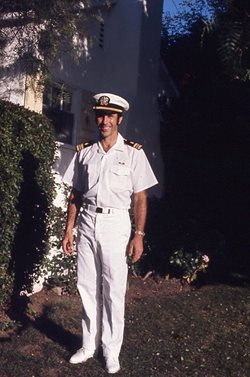News
POSNA Veterans Day Highlight
This Veterans Day, POSNA would like to recognize and thank our POSNA members who have served in the military for their sacrifice and service to our country.
This Veterans Day, POSNA would like to recognize and thank our POSNA members who have served in the military for their sacrifice and service to our country. Today we highlight one member in particular, Tony Herring, who served in the US Navy from 1973-1975 during the Vietnam War.We all know Dr. Herring. He is synonymous with Pediatric Orthopedics. He has trained over 100 North American fellows and has edited and revised 4 editions of Tachdijan’s Pediatric Orthopedics. He was president of POSNA in 1993, awarded the POSNA Distinguished Achievement Award in 2008 and was inducted into the POSNA Hall of Fame in 2019. What many people do not know, however, is that Dr. Herring’s career took a very interesting path through the military during the Vietnam War.
 Dr. Herring grew up in Vernon, TX and graduated from the University of Texas in 1963. From there he entered medical school at Baylor College of Medicine and graduated in 1967. During medical school he participated in the Berry Plan, a Vietnam War-era program that allowed physicians to defer obligatory military service until they had completed medical school and residency training. After medical school, Dr. Herring started his residency training in Internal Medicine at Harvard, where he completed one year of internship before switching to Orthopedic Surgery. He then had to complete another intern year in General Surgery and finally, entered the Orthopedic Residency Program in 1969, finishing in 1973. It was at this time that he fulfilled his 2-year military commitment at the Balboa Naval Medical Center in San Diego, CA. Although Dr. Herring had already chosen Pediatric Orthopedics as a subspecialty, he credits his time in the Navy as forever changing the trajectory of his career.
Dr. Herring grew up in Vernon, TX and graduated from the University of Texas in 1963. From there he entered medical school at Baylor College of Medicine and graduated in 1967. During medical school he participated in the Berry Plan, a Vietnam War-era program that allowed physicians to defer obligatory military service until they had completed medical school and residency training. After medical school, Dr. Herring started his residency training in Internal Medicine at Harvard, where he completed one year of internship before switching to Orthopedic Surgery. He then had to complete another intern year in General Surgery and finally, entered the Orthopedic Residency Program in 1969, finishing in 1973. It was at this time that he fulfilled his 2-year military commitment at the Balboa Naval Medical Center in San Diego, CA. Although Dr. Herring had already chosen Pediatric Orthopedics as a subspecialty, he credits his time in the Navy as forever changing the trajectory of his career. The story of this actually beings with another famous pediatric orthopedic surgeon, Al Crawford, who was a Navy resident at the Chelsea Naval Station in Boston, MA. Dr. Crawford’s training included a number of rotations in the Harvard orthopedic program over several years, which is where he and Dr. Herring met and started their lifelong friendship. When Dr. Crawford finished his residency, he went to San Diego, CA and established a Pediatric Orthopedic service at the Navy Medical Center. Through Dr. Crawford’s help, Dr. Herring was able to secure a position at the Naval Hospital to fulfill his military commitment. Again, following Dr. Crawford’s lead, Dr. Herring was able to participate in the Berg-Sloat Traveling Fellowship through the OREF during his time in San Diego. Through this fellowship he was able to travel nationally and internationally to visit other pediatric orthopedic centers. Not only did Dr. Herring further his education in pediatric orthopedic surgery, but he also learned a tremendous amount about how other programs were managing staff, organizing clinics, doing research and educating fellows/residents. This would come to serve him well at Texas Scottish Rite, where he started on staff in 1975.
As many POSNA members know, Texas Scottish Rite is somewhat famous for its preoperative indication conference, held on Monday nights. The idea for this started during Dr. Herring’s time at the Naval Medical Center where he and Crawford would spend many hours on Monday nights “discussing” upcoming cases for the week. They would even go down to the Cadaver lab with their OR staff and practice their surgical technique before doing the real thing the next day.
Dr. Herring learned quite a bit about fracture management while practicing pediatric orthopedics in the Navy. For example, he treated many children with neglected distal both bone forearm fractures and learned that all of these children remodeled their fractures within 6 months despite not having been treated. This taught him a lot about pediatric orthopedic trauma and which fractures require treatment and which ones do not.
When asked what the biggest lesson he learned during his time in the military was, Herring said he learned to “make the most of what comes along. Instead of constantly looking around and griping, make the most of the circumstance. That’s always been my motto, make the most of the opportunities that come your way.”
